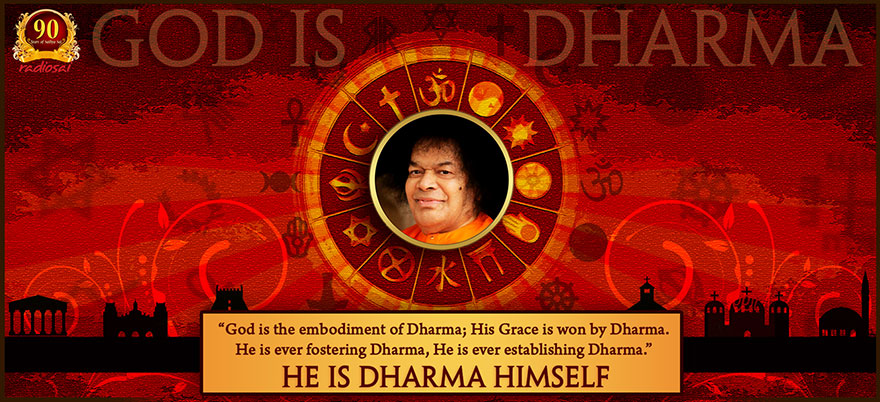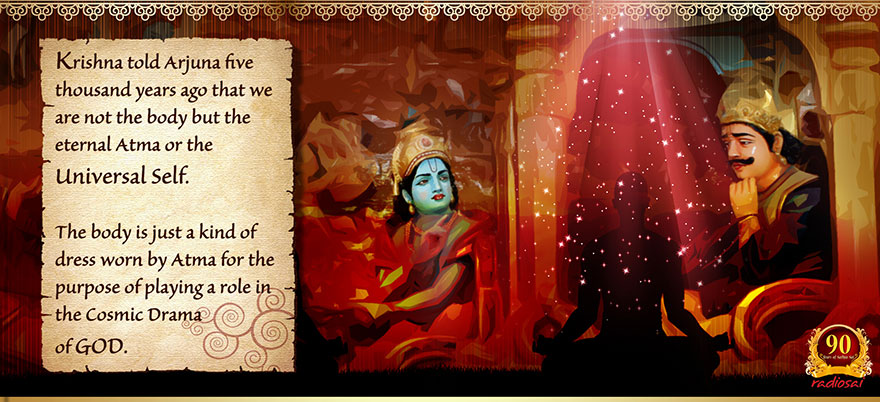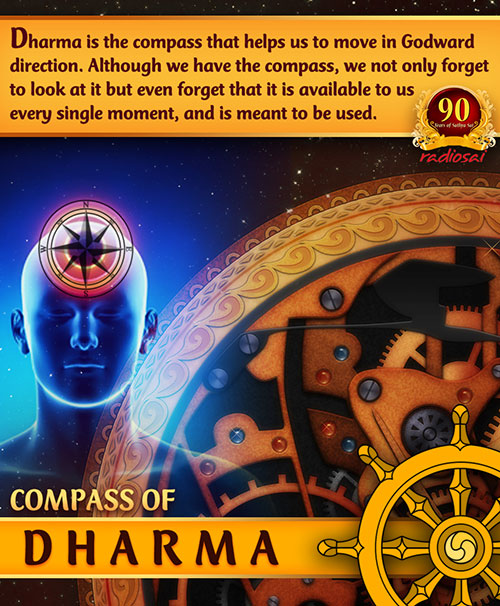|
|
| 'Like' us on Facebook | Follow us: |
Posted on: Mar 13, 2015
 |
Who is on the Path of Dharma
I know you are getting a bit impatient, wondering why I don’t explain what exactly this Dharma is so that you can get a better idea of what it is that you are supposed to swear by. So here it comes!
 |
What is meant by Dharma? What is the essence of Dharma? Can man, common man, lead a happy life and survive if he sticks to Dharma? These doubts confuse the mind of man naturally in the course of his life. Solving them is necessary, even urgent. As soon as the word Dharma is mentioned, the ordinary man takes it to mean: The giving of alms, feeding and providing lodging to pilgrims, etc., the adherence to one’s traditional profession or craft, law-abiding nature, the discrimination between right and wrong, the pursuit of one’s innate nature or the freaks of one’s own mind, the fruition of one’s fondest desires, and so on.
Heard that? Well, that is what most of us think Dharma means, namely that it boils down essentially to giving charity, giving alms, and the usual righteous action. In a limited practical sense that is indeed correct. But you know something? Dharma means much more! Listen now to what Swami says in Dharma Vahini about all this:
Whoever subdues his egoism, conquers his selfish desires, destroys his bestial feelings and impulses and gives up the natural tendency to regard the body as the self, he is surely on the path of Dharma; he knows that the goal of Dharma is the merging of the wave in the sea.
The words we have just heard are very important and so let us try and digest them slowly. The first thing we learn is that for our actions to be truly righteous, certain conditions MUST be fulfilled. To start with, there must be no trace of ego in the action performed. Next, there must not be any trace of selfishness either. If we put these things together, it adds up the following simple formula: “Dharmic action is that which is free from body-consciousness.”
Now of course, for simple folks like us, this might sound like replacing one confusion with another! You might well ask, and rightly so, “What is all this thing about body-consciousness?”
Well, if we pay careful attention to the many Discourses of Swami, we would find that a good many of them revolve around the dangers of body-consciousness and why we should avoid it meticulously.
The Purpose of Life
Many years ago, speaking to students, Swami asked: “What is the purpose of life?” Several answers were given but Swami kept on shaking His head as if to say, “No, that is not the correct answer.” After a while when everyone gave up, Swami smiled and said slowly: “The purpose of life is simple; from God you have come and to God you must return. That is what you must be preoccupied with in life.”
I am sure you would be taken aback to hear that but that is what it is! And this is where the entire issue of body-consciousness comes into the picture. We all think we are the body. Sure we have a body and the body is very important; otherwise, God would not have given it to us. At the same time, we must realise that the body has been given so that it can be an instrument to achieve the purpose of life, as spelt out for us by Swami. In other words, we should not think the body is given for pandering to it and as an instrument for the pursuit of sensual pleasures, etc. Such aberrations occur when we become obsessed with the body and give it far more importance than it merits.
If you are hearing all this for the first time – and it is likely that many of you indeed are – you might ask: “Listen, what is all this about body-consciousness? What else is there? Life is all about the body, is it not?” So it might seem to us, but those who know better say, “We are NOT the body! We are SOMETHING else!!” You might possibly not buy that but let me tell you that exactly is what Krishna told Arjuna five thousand years ago.
 |
Krishna said, “Arjuna, you are not the body but the eternal Atma or the Universal Self. The body is just a kind of dress worn by Atma for the purpose playing a role in the Cosmic Drama of God.”
 |
That is what Swami reminds us of again and again. He adds that we should, realising that we are the Immortal Atma, act accordingly. In turn, this implies that while going through life, we must constantly strive to give up excessive attachment to the body, because such attachment would get us too much tied to the external world.
With that rather long background, I guess you would able to appreciate the quote I now offer.
The aim of Dharma is to make the individual give up the attachment to external nature and the illusion that the external world causes. Dharma must make the individual realise his or her True Reality or rather, un-realise what the individual has now taken as real, so that the life-principle may stand revealed in its genuine identity.
May be that quote appears difficult to understand. It requires detailed explanation and may be I shall postpone the explanation to the second article.
Meanwhile, before I wind up, allow me to make the following remarks by way of recalling some of the points made earlier:
-
1. The human being is really the Atma but with a dress called the human body [along with which, by the way, comes the all-important Mind].
-
2. God gives us the opportunity of birth in
human form not for frittering away life but for spending it such that we merge once and for all in God. The simple rule is: From God we have come and to God we must return; that, you will recall is how Swami describes the purpose of life.
-
3. If we accept that statement about the purpose of life, it immediately follows that every action of ours on earth must be tuned towards moving in the Godward direction.
4. Dharma is the compass that helps us to move in that direction.
-
5. Although we have the compass, we not only forget to look at it constantly but even forget totally that it is available to us every single moment, and is meant to be used. When that happens, we get into deep trouble for sure.
-
6. What is it that causes such dangerous forgetfulness? In one word, it is body-consciousness. In practical terms, it means excessive preoccupation with the curios and fakes offered by the external world. For example, these days, many people, especially the young seem so preoccupied with telling all and sundry all about themselves via one of the numerous web sites created just for this purpose. They spend so much time sending text messages to each other, checking e-mails and what not. Do they spend even one minute thinking of God, their true nature and the purpose of life?
You might wonder what’s wrong with all this. At the level of one individual, nothing catastrophic might happen but if indifference to Dharma spreads to millions and billions, then there can be trouble for all!
These are some of the things that Swami said and wrote four decades ago. The book may be forty years old but Dharma, the subject on which Swami wrote, is eternal and ever relevant. In fact, I would say, mankind has never needed Dharma so desperately as now; and that is why I have ventured to offer this Musings series.
So please do stay with us here in Radio Sai, as we slowly navigate through this most precious of Vahinis, the Dharma Vahini of Bhagawan Baba.
Take care and may God be with you always. Jai Sai Ram.
- Radio Sai Team
| comments powered by Disqus |
What do you think about this Musings? Please let us know by writing in to h2h@radiosai.org. Do not forget to mention your name and country.







